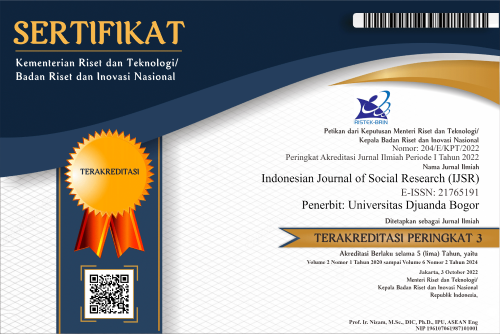Spotify Podcast Become a New Learning Mean for Youth
Abstract
The development of technology, especially in the field of communication, has experienced a significant change in the practice of consuming information or content, teenagers who are not included in the adult/older group or children, are vulnerable to being affected by the new media they consume, one form of digital technology that is developing are podcasts. Spotify podcast is a new medium in the consumption of information or content. The nature of podcasts that can be used freely by teenagers will affect them in social and even educational aspects. The widespread use of podcasts among teenagers makes it a new means of learning. The main problem in this research is how the Spotify podcast becomes a new learning tool for teenagers. The purpose of the study was to find out how Spotify's podcast became a new learning tool for teenagers. Using qualitative research methods, primary data in the form of questionnaires distributed via google form to the youth of Bogor City, and secondary data is the result of previous research. Using descriptive analysis, observations were made with direct observation of the results of the questionnaires that had been collected. The results obtained in this study show that Spotify podcasts are a new educational tool for teenagers that contain elements of education in it, formal or non-formal, packaged in a concise and entertaining way. This research can be a recommendation for lecturers, especially lecturers at the University of Djuanda, to apply the new Spotify podcast media in teaching and learning activities
Copyright (c) 2022 Indonesian Journal of Social Research (IJSR)

This work is licensed under a Creative Commons Attribution-ShareAlike 4.0 International License.
The Authors submitting a manuscript do so on the understanding that if accepted for publication, copyright publishing of the article shall be assigned/transferred to Indonesian Journal of Social Research (IJSR) Universitas Djuanda as Publisher of the journal. Upon acceptance of an article, authors will be asked to complete a 'Copyright Transfer Agreement'. An e-mail will be sent to the corresponding author confirming receipt of the manuscript together with a 'Copyright Transfer Agreement' form by online version of this agreement.
Indonesian Journal of Social Research (IJSR) Universitas Djuanda, the Editors and the Editorial Board make every effort to ensure that no wrong or misleading data, opinions or statements be published in the journal. In any way, the contents of the articles and advertisements published in the Indonesian Journal of Social Research (IJSR) Universitas Djuanda are sole and exclusive responsibility of their respective authors and advertisers.
Remember, even though we ask for a transfer of copyright, our journal authors retain (or are granted back) significant scholarly rights as mention before.
The Copyright Transfer Agreement (CTA) Form can be downloaded here: Copyright Transfer Agreement-IJSR 2020
The copyright form should be signed electronically and send to the Editorial Office e-mail below:
Dr. Rasmitadila, M.Pd (Editor-in-Chief)
Universitas Djuanda
Jl. Tol Jagorawi No.1, Ciawi, Kec. Ciawi, Bogor, Jawa Barat 16720
Website: http://journal.unida.ac.id/index.php/IJSR/index
Email: ijsr@unida.ac.id





4.png)



